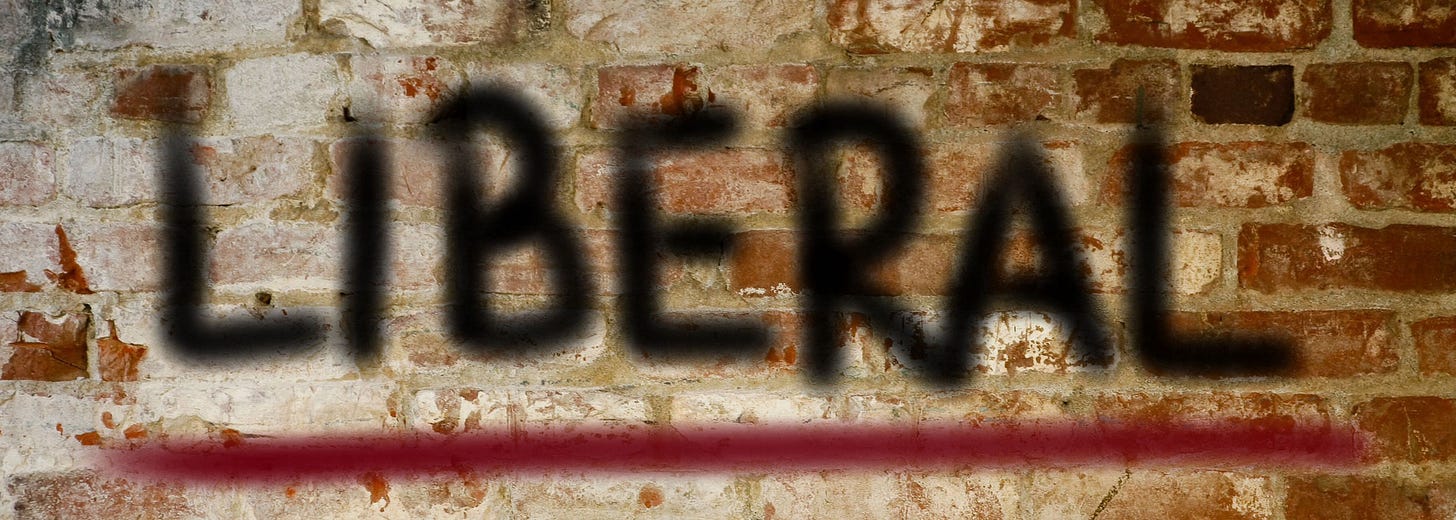E-Pluribus | April 24, 2023
Taking the sting out of "liberal"; on not just telling people what they want to hear; the rule of law must be the rule for all.
A round-up of the latest and best writing and musings on the rise of illiberalism in the public discourse:
Fred Bauer: The “Liberal” in All of Us
In the decades surrounding the turn of the millenium, few political words had the pejorative power of “liberal” (perhaps at least in part to Rush Limbaugh). At City Journal, Fred Bauer reviews Michael Walzer’s latest book, The Struggle for a Decent Politics, which considers the word liberal as an adjective and what it means in various contexts across the political and ideological spectrum.
A debate about liberalism broadly understood suffuses contemporary American political life. Some critics of liberalism—perhaps most notably, Notre Dame professor Patrick Deneen in Why Liberalism Failed—argue that a liberalism of relentless autonomy has dissolved social bonds and led to an alienated misery. Others insist that liberalism should be defended from an onslaught by post-liberalism, nationalism, populism, and other supposed reactionary terrors.
Rather than conjuring some titanic clash between isms, Walzer offers a more parsimonious account of “liberal” as an adjective. Here, what is liberal is not the product of some grand ideology, nor does it necessarily lead to a single set of conclusions (as ideological narratives often do). Instead, it is marked by ambiguity, toleration, pluralism, and an acceptance of openness. That spirit of generosity is not the same as moral relativism: liberals “oppose every kind of bigotry and cruelty.” But it is marked by some acceptance of difference and an openness to correction. For Walzer, the “liberal” is not an ideology but an accent for an ideology; it is “not who we are but how we are who we are—how we enact our ideological commitments.” The “liberal” is thus compatible with a wide range of ideological orientations, and the course of the book is dedicated to exploring the liberal flavors of different ideologies (all dear to Walzer’s heart): liberal democrats, liberal socialists, liberal nationalists and internationalists, liberal communitarians, liberal feminists, liberal professors and intellectuals, and liberal Jews.
In this sketch of the “liberal” as not ideologically tethered, Walzer taps into a broader tradition. Judith Shklar’s “liberalism of fear,” which he cites as an inspiration, argues that the core of the “liberal” is the avoidance of cruelty. Helena Rosenblatt’s more recent The Lost History of Liberalism also broadens the valence of the concept by attending to diversity and even tensions within different liberal traditions. Walzer does not discount the possibility of liberalism as an ideology; he argues that liberalism in this sense (of free trade, open borders, radical individualism, and so on) has many resonances with contemporary American libertarianism. However, he also hopes to show how “liberal” as an adjective can be compatible with a variety of other traditions and political approaches. The “liberal” supports pluralism in numerous ways.
Read it all here.
Berny Belvedere: The Freedom to Tell the Truth
Last week, our round-up included Berny Belvedere’s take on rage-bait. In a later post, Belvedere takes up the related theme of “audience capture” and why writers, pundits and other participants in the public discourse must ground themselves in truth and principle and not simply an attempt to scratch the itches of those to whom they are speaking.
A love for truth is paramount. We show it the respect it deserves by attuning our hearts to desire it more than comforting illusions, or financial gain, or social respect, or anything else that steers us away from preeminently valuing it.
One particularly subtle danger is audience capture, which over time can erode a person’s commitment to truthtelling without them ever noticing.
[ . . . ]
When I say “captured” that means occupying a place in the discourse where you are fundamentally performing a part, or where you have to actively suppress what you really believe due to investors disagreeing with it, or advertising people not approving of it, or an audience not appreciating it.
[ . . . ]
When you join a specific side, there is remarkable pressure not to go against their interests. For people who are naturally tribal, and want to continue to be, this isn’t really an issue. For them and their supporters, there’s a perfect synergy of writer inspiration and audience expectation. But if you’re not naturally a party man, a tribal person, then it is crucial for you to struggle mightily against the system. The architecture of social media does its best to box you in. You are promised likes and shares when you say something your followers like, but unfollows and scorn when you say something they don’t.
The solution is to avoid putting yourself in a situation where the makeup of your audience is so incongruous with who you are as a thinker, so unrepresentative of where you actually land on the issues, that it disinclines you from sharing what you actually think. The reality is that if you know most of your followers would disapprove of a tweet or post, that can create remarkable pressure to withhold it—or, worse, to assert its opposite.
Read the whole thing.
Megan Wildhood: The Sanctification of the Self
You’ve heard the old saying “the exception proves the rule?” Well, it doesn’t, and especially not when we’re talking about the rule of law. At Quillette, Megan Wildhood discusses how our modern culture of self-focus distorts our perception of one standard of justice for all.
. . . Rather than teaching children how to lose and process their emotions healthily while remaining respectful of—and even happy for—those who win, participation trophies became the norm for an entire generation. Children didn’t have to confront disappointment or learn how to examine their performance for ways to improve. And parents didn’t have to deal with children’s distress after falling short of their goals. The upshot? Arrested development all around.
Bubble-wrapping children out of a sincere but shortsighted desire to protect them from every ill doesn’t produce functional adults, it breeds entitlement and vulnerability and delays the process of cognitive and emotional maturation. Today, as a society, we seem to be experiencing an indefinite extension of adolescence. This is a problem, not least because one of the traits for which teenagers are most famous is rule-breaking. Teenage rebellion won’t topple a society when it’s limited to a phase of life, but our society is training people to engage in rebellion as a way of life and calling it social-justice activism.
The fragilization process continued with the arrival of content notes and trigger warnings. Children who never had to work through difficult feelings of failure become adults who believe that other people are supposed to protect them from ever encountering anything uncomfortable. This corrodes the idea of personal responsibility. When taken to its logical conclusion, the widespread demand for content and trigger warnings makes accountability, even from the legal system, seem incongruent with the lesson society has been teaching children for decades: someone else is responsible for your feelings.
We can trace a direct line from content warnings to “harmful words” lists and microaggression trainings in which people are trained to be afraid to say anything, including what they would intend to be compliments. In this world, impact matters and intention does not. Someone could take offense at anything and demand an apology for the impact they alone defined. Society is training us—socially and in the workplace now—to be emotionally codependent on others rather than considering why we might be so easily offended that we hear kind words as insults.
Read it all.
Around Twitter
The Foundation for Individual Rights & Expression and others react to a congresswoman’s jail threat against journalist Matt Taibbi:
Via Reason and Emma Camp, a story of student-run (more like frontier) justice at the University of Virginia (click for the whole thread):
And finally, the New York Times with breaking news from 2020:












